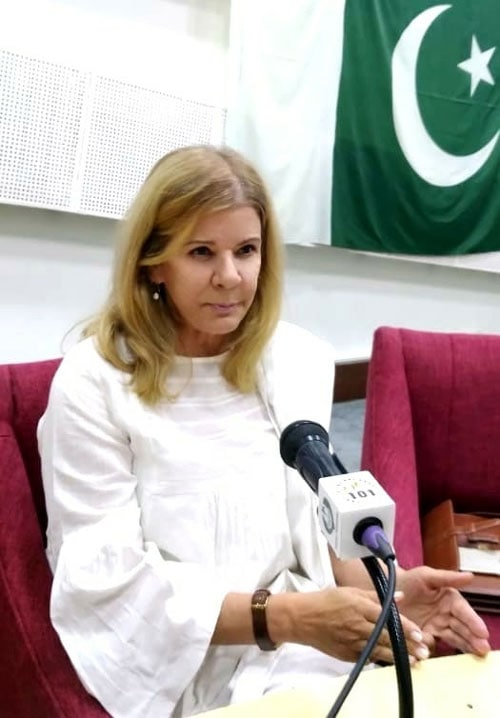Covid-19 pandemic is exposing youth to more risky behaviours, pushing drug criminals online and has brought about new ways to trafficking of drugs.
The range of substances and combinations available to users has never been wider, and the amounts produced have never been greater.
These views were expressed by Chairperson of the KKAWF, Cristina von Sperling Afridi in an interview with Pakistan Observer on the eve of the International Day Against Drug Abuse & Illicit Trafficking on Friday.
She said the drug problem impacted Pakistan in a devastating manner as it was a silent killer and a menace for the entire society.
Following is the edited text of her interview:
Pakistan Observer: What is the mission of the Karim Khan Afridi Welfare Foundation which you set up in 2015?
Cristina von Sperling Afridi: The Karim Khan Afridi Welfare Foundation (KKAWF) which I along with my husband founded in 2015 is dedicated to fighting the war on drugs with a focus on youth empowerment and Prevention education.
KKAWF has rich experience on promoting healthy behaviour among the youth regarding adverse effects of drug abuse.
It implements its mission by equipping the youth with better knowledge and awareness, breaking taboos through life-skills focused drug use prevention education.
PO: How does the drug problem impact Pakistan especially in times of Covid-19? Who is at most risk of falling prey to drugs?
Cristina Afridi: Due to its proximity to the busiest drug corridor, the drug problem impacts Pakistan in a devastating manner, it is a silent killer and a menace for the entire society.
Hundreds of people die each day in Pakistan due to drug-related complications exceeding the number of deaths inflicted by terrorism. Drug menace is a national crisis of a scale more intense than other health outbreaks.
There are an estimated 8.9 million drug users in the country, and close to 5 million addicts – which represent the highest numbers worldwide. It is, unfortunately, the home to the largest market for heroin consumption.
The onset of the Covid-19 pandemic has propelled the world drug problem further to become the most urgent public health challenge in Pakistan and worldwide. It has brought the “war on drugs” into sharp focus once again.
PO: Why is Pakistan falling short on its efforts to deal with the drug use?
Cristina Afridi: The case for drug prevention, addiction treatment and rehabilitation service in Pakistan was falling short and the response to the drug problem we have to accept is inadequate.
It is a bitter fact that a huge number of our young generation use narcotics, in particular in educational settings.
Unfortunately, there is a little effort at prevention as a weapon in the fight against drug use.
It is time that we in Pakistan should collectively focus on the power of prevention to educate our school going teenagers on the dangers of indulging in the use of recreational drugs.
PO: Why does KKAWF focus on Prevention to tackle the drug use?
Cristina Afridi: KKAWF focuses on prevention as we know that it is an evidenced based approach to take youth away from drugs. It builds their protective factors and promotes positive behaviours and draws them away from risky behaviours.
It builds their social and personal skills to better deal with peer pressures and helps them to identify, understand and manage emotions.
PO: What are KKAWF approaches it uses in its prevention education programmes?
Cristina Afridi: KKAWf has successfully engaged with educational institutes in Pakistan through regular “Drug Awareness Weeks” and held interactive life-skills focused sessions with students to create better knowledge and understanding on drugs to promote healthy behavior.







